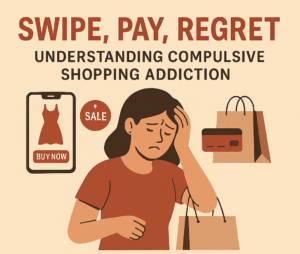🛒 Swipe, Pay, Regret: Understanding Compulsive Shopping Addiction
 We’ve all indulged in the occasional retail therapy. But what if that dopamine rush of buying turns into a cycle of regret, guilt, and empty wallets?
We’ve all indulged in the occasional retail therapy. But what if that dopamine rush of buying turns into a cycle of regret, guilt, and empty wallets?
Shopping addiction, also known as oniomania, is one of the most socially accepted behavioral addictions—but that makes it even harder to spot and treat.
With online sales, one-tap payments, and midnight deals, compulsive shopping is on the rise in India, especially in cities like Chennai where access to digital retail has exploded.
🧠 Why Shopping Feels So Good
Buying something new releases dopamine, the feel-good chemical. But this high is short-lived. Soon, the brain craves more—not out of need, but to relieve boredom, stress, or low mood.
Online shopping makes it even easier to fall into the trap:
-
Discounts and flash sales create urgency.
-
Easy returns remove hesitation.
-
Algorithms push “recommended” items, personalized for your taste.
Over time, this turns into a habit loop: Trigger → Craving → Purchase → Regret → Repeat.
🚩 Signs of Compulsive Shopping
Ask yourself:
-
Do you shop to feel better when you’re bored, anxious, or lonely?
-
Do you hide purchases from your family or feel ashamed afterward?
-
Do you often buy things you don’t need—or already own?
-
Do you rely on credit cards or EMI options to fund purchases?
-
Are you stuck in a cycle of regret, guilt, and promises to stop?
If you said yes to more than one of these, it may be time to reflect.
✅ Tips to Curb the Urge
-
Track your triggers: Is it boredom? Emotional stress? Targeted ads? Identify what sets off the urge.
-
Follow the 24-hour rule: Delay non-essential purchases for a day—most impulses fade.
-
Use cash or prepaid wallets: Limit how much you can spend.
-
Unsubscribe from sales emails and notifications: Out of sight, out of cart.
-
Create a shopping list—and stick to it. Anything not on the list can wait.
💡 Chennai Case Example: “I Didn’t Realize It Was an Addiction”
M, a 32-year-old HR executive in Chennai, would browse Myntra every night to unwind. Her online cart was a mix of deals, trends, and impulse buys. She racked up 5 credit cards over two years.
Only after her partner confronted her about their spiraling debt did she seek help. With therapy and budgeting tools, she regained control—and peace of mind.
👨⚕️ When to Seek Help
Compulsive shopping is more than a money problem—it’s often tied to emotional regulation issues, self-esteem, and unprocessed stress. Psychotherapy can help:
-
Identify the emotional roots of the addiction
-
Develop alternative coping skills
-
Restructure unhealthy spending patterns
📍 Chennai-Based Support for Shopping Addiction
If you or someone you know is struggling with compulsive shopping, don’t wait for it to impact your finances, relationships, or emotional well-being.
📞 Reach out for expert psychiatric support in Chennai:
Dr. Srinivas Rajkumar T
Consultant Psychiatrist
📍Apollo Clinic – Velachery & Tambaram, Chennai
📧 srinivasaiims@gmail.com
📱 85951 55808
Recovery begins with a conversation.
Your wallet—and your well-being—deserve better.